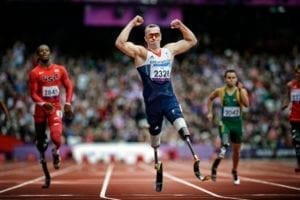Yeji Lee
Toronto, Canada
 |
| Richard Whitehead (Centre) crosses the finish line in the London 2012 Paralympic Games on September 1, 2012. AFP photo / Adrian Dennis |
In the past the disabled have often been isolated from the rest of society by structural, physical, and emotional means, considered irrelevant or even detrimental to the development and function of the larger majority. The lame could not physically work; the deaf and mute could not communicate with others; the blind could pose a physical hazard to both themselves and the people around them.
But in 2017 the disabled are no longer marginalized in society. The walls built around them have been chipped away little by little; and revolutionary thought and technology have completely changed the role and potential of the disabled person in society. Not only have these advances forced society to incorporate the disabled into the larger majority, but they have also revealed that the disabled can often represent the undiscovered potential of mankind.
In the 2016 Rio Paralympics, gold medalist Abdellatif Baka not only beat the Paralympic world record, but he and three other disabled middle-distance runners outran Matthew Centrowitz, the Olympic gold medalist of that year. Grammy-winning percussionist and composer Dame Evelyn Glennie’s deafness has forced her to form a new and different connection to her music. Because she cannot hear, Glennie senses sound vibrations through her body (her feet, hands, chest) and creates music by sensation rather than hearing. She sees her deafness as having given her a deeper understanding of music. Stephen Hawking’s motor neuron disease would have devastated his career if not for his computer-based communication system. Technology has allowed him to convey his mind and ideas in spite of his disability—something that would not have been possible in the past.
Through the creation of new methods and new technology, the implications of being disabled have been refashioned. The Paralympics have become a platform to train and challenge physical limitations outside standard conventions. Deafness has given Glennie the opportunity to create music in unconventional ways—broadening the spectrums of art. Technology has provided Stephen Hawking with the medium through which he can convey his thoughts and theories—thereby pushing the boundaries of human knowledge and our understanding of the world. No longer is the conversation about disability one about overcoming deficiency, of replacing loss.1 In the context of a technologically and socially advanced society, disability has begun to symbolize the hope of mankind in realizing its fullest potential because those who are disabled have pushed themselves to explore the limitations of human capabilities outside conventional means.
But we need to keep in mind that accepting the disabled does not mean making them as much like the majority as possible. Many in the disabled community largely identify themselves with their condition, and society’s attempts to alleviate or alter their disability are often received with hostility. Some members of the deaf community have been hostile to cochlear implants—a surgically implanted electronic device that allows deaf patients the ability to hear, stating that the implant is an affront to their culture. The emergence of prenatal testing and selective abortion has brought forward difficult questions about whether people should have the right to decide whose “lives are not worth living.” It is not about accepting the disabled despite their differences; it is about acknowledging that differences can be valuable to understanding both our “collective humanity”1 as well as advancing towards the full potential of humankind. Whether a disabled person decides to alleviate their disability or accept it as part of their identity, their decision should be met with respectful understanding and consideration.
Yet in 2017, the disabled are still at risk of being rejected, mocked, and snubbed. We currently live in an era defined by a mass refugee crisis, in a time of fear towards the “different,” the “strange,” the people who are “unlike us.” The emergence of these turbulent times and attitudes requires an intentional struggle to “mov[e] closer to understanding our collective humanity.”1 The way to accomplish this is “to celebrate those heartbreaking strengths and those glorious disabilities that we all have.”1 Whether it is towards those who come from different cultures and countries, or those who are physically or mentally disabled and different, the threat to the progress to include and accept those unlike us cannot be ignored; the way to combat the antagonistic oppositions to the different, the strange, the unfamiliar is to intentionally and frequently “remind each other of the privilege and the responsibility of the act of empathy.”2
References
- Streep, Meryl. “Meryl Streep powerful speech at the Golden Globes (2017)”. Filmed [Jan 2017]. YouTube video, 5:47. Posted [Jan 2017]. https://www.youtube.com/watch?v=EV8tsnRFUZw.
Further reading
- Glennie, Evelyn. “How To Truly Listen”. Filmed [Feb 2003]. Ted Talk video, 32:09. Posted [Feb 2003]. https://www.ted.com/talks/evelyn_glennie_shows_how_to_listen#t-95116.
- Menezes, Jack. “Paralympics 2016: Four 1500m runners finish faster than Rio Olympics gold medal winning time.” Independent, September 13, 2016.
- Mullins, Aimee. “The Opportunity of Adversity”. Filmed [Oct 2009]. Ted Talk video, 21:58. Posted [Oct 2009]. https://www.ted.com/talks/aimee_mullins_the_opportunity_of_adversity#t-4160.
YEJI LEE is a fourth-year English Literature student at the University of Toronto. Born in Seoul and raised between Canada and Korea, she is currently working as a journalist while finishing her last year of university.

Leave a Reply